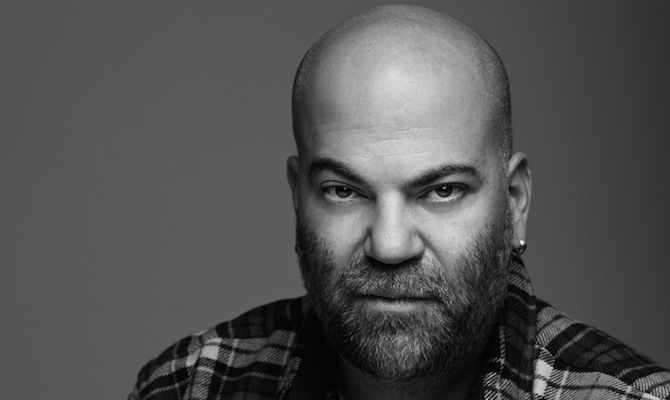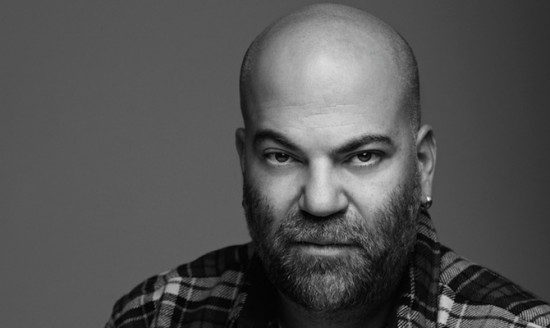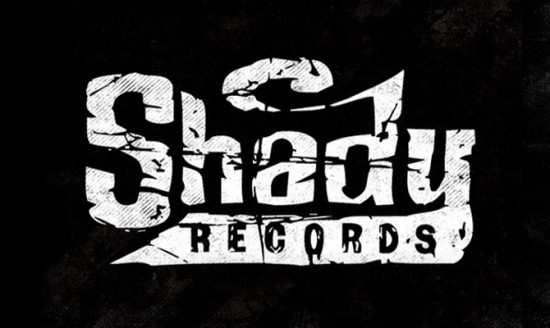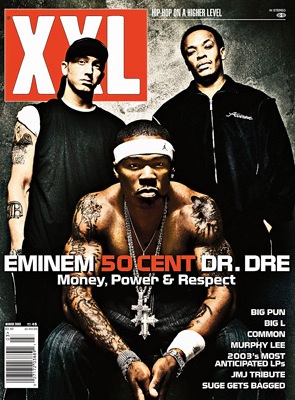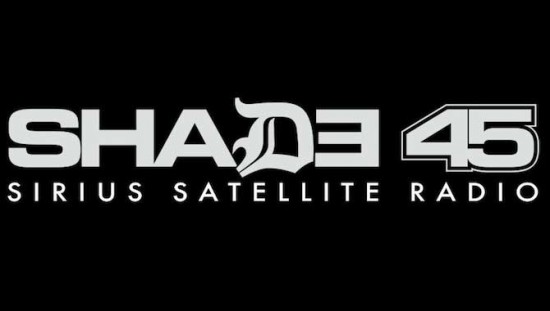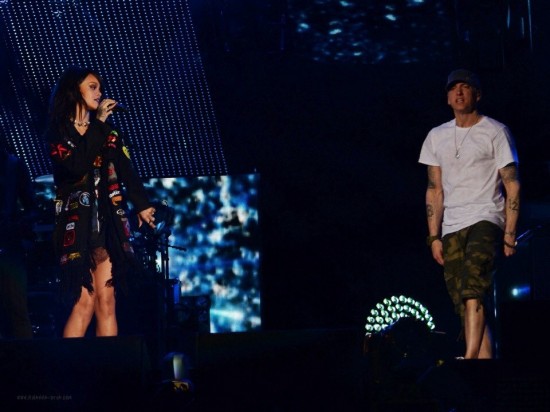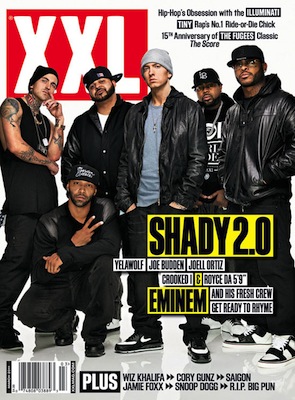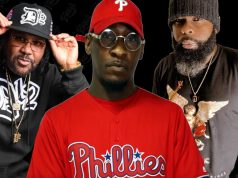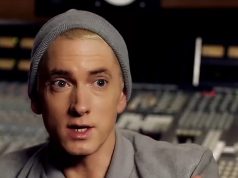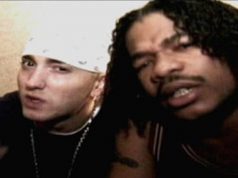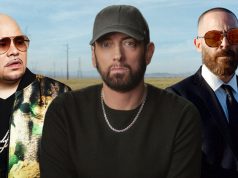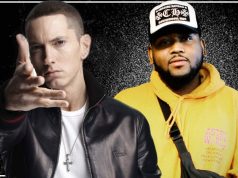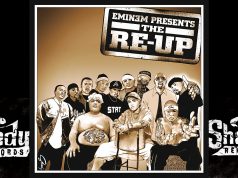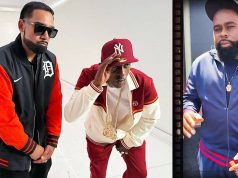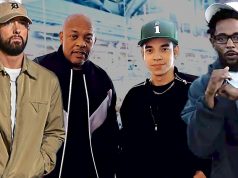It was 15 years ago, in the aftermath of Eminem’s second major label album, The Slim Shady LP, when Em and his manager Paul Rosenberg launched Shady Records in conjunction with Interscope. In the decade and a half since, the label has put out 14 projects from the likes of D12, Slaughterhouse, Obie Trice, Yelawolf and, most significantly, 50 Cent, who signed a record-setting million dollar label deal with Shady/Aftermath/Interscope in 2002. Those 15 years saw both Em and 50 rise to become two of the most successful rappers in the history of the genre, with tens of millions of records sold between them, while the label as a whole (not counting Eminem releases) produced six No. 1 albums and a further five that debuted in the top 10 of the charts, a run that can stand up next to any other label in the genre.
Last month, on the night of the MTV VMAs, Eminem tweeted to confirm that Shady Records would be celebrating their 15 years in the game with a double album, called Shady XV, out on Nov. 24, which will be comprised of a greatest hits collection on one disc and a label compilation featuring new music from Eminem, Bad Meets Evil, D12, Yelawolf and Slaughterhouse on the second. Ahead of the label’s 15th release, XXL spoke to Shady Records co-founder Paul Rosenberg about the label’s highs and lows through the years, the successes and beefs that came with signing 50 Cent and where the label is headed in the future.
XXL: What were your goals when you started Shady Records?
Paul Rosenberg: Marshall wanted to put on D12 and I wanted to start a label. And Interscope, who is a label that has traditionally been very supportive of artists developing their own talent, specifically producer-driven talent, [offered a label deal] and we jumped at it.
Has the goal for you guys changed over the past 15 years?
The goal has always been to put on music that we like; to be able to put out artists that we like and hopefully other people will like as well, and it just gave us a platform to be able to do that. It’s never really been, “Oh, hey, let’s go get rich making a record label”; that was never really the approach or intent. It was always about things we were passionate about.
In the first couple years, what was it like getting your feet wet as a label and building things from the ground up?
Well the first thing Marshall wanted to do was to give the guys that he came up with a place to be able to release music, and he was eager to do that from the beginning. So after he was established and he had the ability to do that, he went back to the guys that he came up with, namely the guys from D12, and said, “Hey, let’s put the group back together and release it on my label.”
Devil’s Night went to No. 1 on the Billboard 200. What did that do for you guys early on?
Well at that point we realized that we could sort of have Marshall’s fan base, with him as an artist as Eminem, along with the stuff we were putting out with the label, and give it a really big platform to be able to do some things that were maybe a little bigger than we initially had envisioned.
And then one of the biggest early things you guys were able to pull off was signing 50 Cent. What was the impact of that for you guys?
Yeah. It was game-changing. We kind of knew what we had in 50, and when we brought him to Dre to see if he wanted to do it with us, Dre immediately got it as well. We all knew it was gonna be big and it was gonna be sort of a land shift in the culture because of what he was doing, but we didn’t know just how massive it was gonna be. But I’m not gonna sit here and tell you that we didn’t know that 50 was gonna be enormous from the beginning. I mean, look, that was huge for us, that was huge for 50, it was huge for XXL, frankly. It was massive all around, and it was one of the most exciting things we’ve ever done with the label.
And what’s 50′s status with the label now? He left Shady when he left Interscope, right?
Yeah, so 50 is on G-Unit Records and he’s got his own situation through Caroline, and he’s no longer on Shady because our deal is with Interscope as well. On our behalf, it was a very friendly and, frankly, supportive departure, where we told him, Look, if you don’t feel like this is the place for you anymore, we feel like we want to support you in any way we can [so that you can] be able to do what you want to do. So behind the scenes we were trying to make sure that the transition was going to be as comfortable for him as possible. And you know, Marshall and 50 continue to have a great relationship, and that’s not gonna change.
Over the 15 years, what would you consider some of the highs and lows of Shady Records?
There was a time, right after 8 Mile—we put that soundtrack out on Shady—and then shortly after we put out 50′s album [Get Rich Or Die Tryin’], where I felt like we could have really put out more projects and had a lot more success. But we’ve never been about quantity, we’ve always been more about making sure that things are planned and that the quality is where it needs to be. So we didn’t release that many projects. And looking back I kind of feel that we should have, just in terms of the amount of heat that we had behind the label at the time. But that was also a high point, so I would call that a high and low at the same time.
You guys got pulled into a lot of beefs around that time, too. Was that difficult to navigate?
I mean, yeah, of course. It was a very hectic time in a lot of ways, and there’s a lot of it that I look back and I don’t miss. But it was also very exciting and it was part of the package. I mean, we knew when we were signing 50 that we weren’t signing a choir boy, so it wasn’t a huge surprise when things got a little bit hectic. We just didn’t know exactly how hectic it was gonna get and where it was gonna go. There was a lot of bad shit that happened that I really don’t look back that fondly on, but like I said, that went with the game at that time.
Launching Shade 45 was also pretty big for you guys. How did that change things?
I think at the time, Interscope was interested in doing a channel, and there were relationships with some of the executives and they came back and said to us, hey, it wouldn’t be really right for us to do a station with a full major record label like that, but what about doing something with Eminem? He has a record label, but I think we could make it more artist-driven. So Interscope brought it over to us, and of course we jumped at the opportunity, because who wouldn’t want to have their own radio station? We didn’t have any experience with it at the time other than just growing up on radio in general.
So again, one of the things we wanted to do with the station was to be able to give some of our friends who had talent some opportunities on air. So we reached out to Rude Jude, who we had been friends with from Detroit and thought he’d be great on radio. Reached out to Lord Sear, who had been on the radio in the past obviously, with Stretch and Bobbito, but who didn’t have a platform at the time. Gave Cipha Sounds his first morning show, gave Angela Yee her first on-air job ever, and then when they moved on to do what they’re doing now, reached back out to our old friend Sway and gave him the opportunity to do mornings again with us. We had the relationship with Sway from way back in the day when Marshall used to go on the Wake Up Show in like 1997 in L.A. So those relationships were always really important, and we try to look at the opportunities that we have and give people that are talented that are friends of ours a chance to do something with us.
So that’s what we did with the radio station, and just programmed it as much as possible to be [like], yes, it’s Eminem’s radio station, but I never wanted it to be a station for just Eminem songs or Shady songs. I know that there’s a lot more music out there than just that that people wanna hear. So we said, alright, it’s gonna be that; definitely we’ll play more Eminem songs than other radio stations, yes we’ll play more Shady Records artists than other radio stations, but it should also play the stuff that Eminem and I and our artists wanna hear. So that’s what we really tried to do. By doing that, we made it unique in the sense that it’s a place where there’s a lot of stuff that we play which I don’t think you can really hear on other radio stations. And it just became a place where you can hear not only that, but where we can try to break new artists and break new songs, which I think we’ve accomplished.
You guys have also had some pretty massive tours throughout the years. Are there any moments that really stick out for you from any of those big tours?
This wasn’t an arena tour, but this is a memory that really sticks in my head. We were talking about how there was a time when things were really hot, when we were doing Summer Jam with 50 at Giants Stadium. I don’t remember what year it was—’03 or ’04—and we were having Em perform; I think he was a surprise guest with 50 at Summer Jam. And there was just a sea backstage—literally, a sea—of dudes in fitted Yankees hats, white tees and bulletproof vests. And then there was another sea from the Shady camp all wearing Obie Trice shirts and Detroit hats. And the sea of like, literally, 200 people coming together backstage was a pretty awesome sight.
And then when it comes to the Anger Management tours, there were a lot of memories. One year we had a Ferris Wheel on stage and the whole vibe for Marshall’s show was The Eminem Show. So there was a Ferris Wheel on stage, and we had Lord Sear coming out in a top hat and a tux, and I just remember him bitching about how hot it was every show, because, you know, it was the middle of the summer and we were playing a lot of outdoor sets. So that was pretty funny as well.
But you know, there was also some rough stuff; some of that time period when Marshall was battling his addictions, so some of those times weren’t his best moments on stage. Looking back at that stuff isn’t really fun. But since Marshall’s been sober he’s spent a tremendous amount of time making up for that, not just to himself but to his fanbase. So he’s at a point right now… I don’t know if you saw the shows we did with Rihanna, but he’s just extraordinary at this point, really in his prime in terms of his live performing. It’s really exciting to watch, and it’s exciting to see how far he’s come from those days when he wasn’t 100 percent with it.
You mentioned Rihanna; they’ve always had such great chemistry on record. How did that relationship start?
You know, it started because Marshall wrote a record along with Skylar Grey that, because of the circumstances that Rihanna was coming from with her past and her difficult relationship, that he thought that she would be able to really deliver and really sell the song. So that’s really where it first came from; he was thinking to himself, Who can I get on this record that’s really gonna be appropriate and you’re really gonna be able to hear that pain and authenticity in their voice when they’re singing that? And she really fit the bill for that.
And everything’s really developed since then.
Yeah, it’s really developed since then; they really hit it off, they just sounded great together and obviously it worked so well that when we had the opportunity to do some more records, initially it was like, you know, we don’t want to just repeat ourselves. And then we brought it to Dre, and Marshall said to Dre, “Hey, what do you think about me getting Rihanna to do another record with me?” And Dre was just like, “Man, it worked before, right?” Em said, “Yeah,” and Dre said, “So what’s the problem?” So that’s the attitude we went in with it: yes, we’ve done this before, but if it ain’t broke, don’t fix it.
A couple years ago you guys brought Slaughterhouse and Yelawolf on board and launched the Shady 2.0 movement. Did that feel like it revitalized the label?
It absolutely did, and one of the things I’m most proud of with that is, we signed a couple artists prior to that where unfortunately we weren’t able to release their records for one reason or another. And we didn’t want to continue to have a reputation where you could get signed and your record might never come out. So the goal for me and Marshall was, we’re signing these new artists, we’re gonna announce this Bad Meets Evil project: these things are coming out. We’re gonna do everything we can to make sure these things come out and do the best job possible. So I was really proud that we executed that and put a few projects out in a short period of time.
Now with Shady XV, what was the idea behind putting together a compilation for the anniversary?
So one day we were sitting talking about what we’re gonna do this year. We’ve started rolling out the Yelawolf album, that’s gonna continue this year, and Slaughterhouse is still working on their project. So we were like, alright, we want to get something out this year ’cause it’s the 15th anniversary of the label, and then it dawned on us that this would actually be the 15th project we’d be releasing, which just sort of lined up nicely. So we thought it would be a good time to go back and do a retrospective on the “greatest hits,” quote unquote. And they’re not gonna all just be hits like “Lose Yourself” and “In Da Club,” these massive songs, but some of the sort of favorites of the fans and ourselves as well. And then also the chance to put out some new music, as well, because we just want to keep releasing stuff. So there’s gonna be a compilation of new music from the artists on the label as well.
Fifteen years, Shady Records. As a co-founder, what does this label mean to you?
That’s a good question. I think as far as myself and Marshall, it’s something that we’ve just babied and built from scratch; it didn’t exist until we created it, and we think we’ve turned it into a well-recognized worldwide brand that stands for something. So it’s something that we’re really proud of. We don’t plan on stopping anytime soon; Marshall’s always said that if [he] ever does decide that [he] doesn’t wanna be in the front, then [he’s] going to definitely always sort of focus on producing and releasing music. And don’t make that sound like he’s doing that now, because he’s not. But it’s something that we’re planning to continue; there’s no end date for us, it’s an indefinite thing as far as we’re concerned.
[via XXL]


